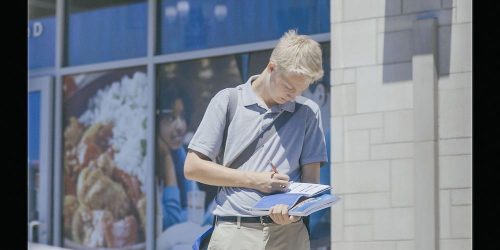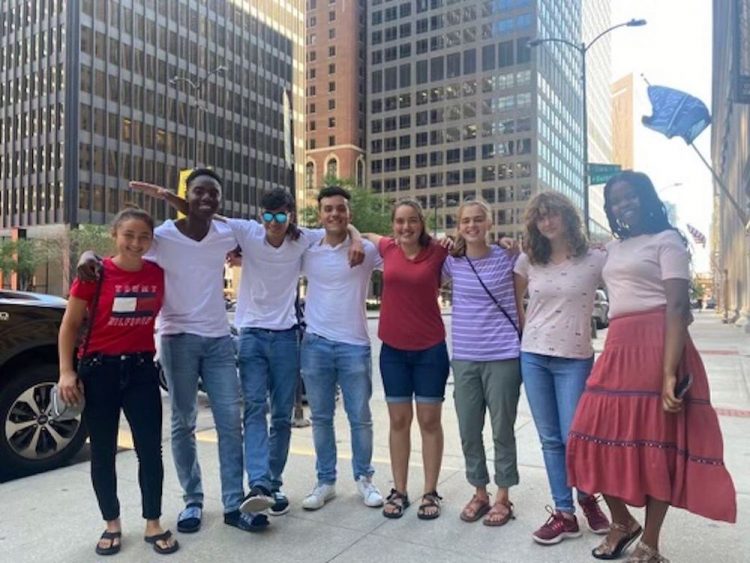"The (Very Scary) Next Door"
September 1, 2022 | Judy Klein | Communications

The sky was a murky gray and the rain was heavy, soaking everything, including Canaan Francisco, a Youth Rush canvasser working in the Kalamazoo area. His books were wet, his shoes were wet, and the plastic bag he had slung over his books pooled water and poured onto his shirt, drenching him even more. To make things even worse, a woman was screaming obscenities four apartments down. It was Francisco’s second day canvassing, and the whole experience was unnerving.
Francisco was canvassing with his friend, Johannah Anderson. “I just knew that we were going to have to canvass her,” Francisco says. The combination was terrible: rain, inexperience, and screams. “I found myself wondering,” he says, “What kind of place am I in? What am I doing here?”
Anderson and Francisco continued working towards the woman and canvassed everyone they saw. When they neared her, she knew that she was next. She snapped, “No, don’t come near.” All the canvassers had done was smile and say, “Hi.”
They skipped the woman and went to the next door. But Francisco didn’t feel right—he felt impressed that he needed to go back and ask the woman “just once” if he could pray with her.
They went back and interrupted her screams. “Please,” Francisco asked, “Can we pray with you?”
Francisco reports that as soon as the words left his mouth, the woman’s face softened. “Her face went from anger to gentleness,” he says. The woman shared that she was going through a rough period. All three of them held hands and prayed. When they had finished, the woman thanked them—they had come at just the right time. “I was feeling so hurt, so bad,” she told Francisco.
Anderson and Francisco offered her Bible studies, and she excitedly accepted. When Francisco explained that she could either get them through the mail, or have someone come to her house and study with her, the woman eagerly exclaimed, “I want people to come to me. I want to hold their hands and pray!”
When they finished talking, they held hands again and prayed. Francisco gave her Happiness for Life (Steps to Christ).
As Francisco reflects on this moment, he realizes how God truly orchestrates moments and events in everyone’s life. “What if I had just walked on by, and didn’t ask for prayer?” He asks, “Where would her anger have taken her? Would she have hurt herself? God used me, through a prayer, to bring peace to her and calm her storm.”
No one but God knows what would have happened to this woman if Francisco had listened to himself—his irritation at the rain, his fright of the woman’s screams, or his desire to not bother someone who was upset.
“Even when it is raining,” says Francisco, “there can be showers of blessing. I think God just has a divine appointment every day, and we just have to endure and carry on and be willing to step out—it’s not like we are going to melt!” he says, laughing.
Hardship will not melt us. Francisco isn’t the only canvasser this summer who has learned this lesson.

David Pano, Literature Ministries director for the Michigan conference, reports that this Youth Rush summer has been unusually hard. “[I’ve been] in the work in Michigan for many years, and I haven’t seen so many challenges.” Some program participants have struggled with health challenges, including COVID, and there has been family loss. “Students and leaders,” Pano says, “are facing more challenges to be in the program, and to stay in the program.”
But despite the hardships, the rain, the screaming, and the sickness, Pano reports that there are amazing stories. There are hundreds of thousands of stories, in fact, because the program students have knocked on over 95,000 thousand doors—that’s 95,000 thousand opportunities for a soul, or a family of souls, to be reached. “We are seeing results,” says Pano.“You see people coming to church, desiring to learn more about Jesus and the Sabbath and Adventism. We are meeting people who are already keeping the Sabbath.”
The Youth Rush program in Warren has been working with Arab communities. There is a Michigan Youth Rush program in Indiana, a partnership between the Indiana and Michigan conference in an attempt to revive Youth Rush in Indiana. The Kalamazoo program traveled to unreached Chicago suburbs to share the Word. Roughly 18,000 pieces of literature were distributed—2,400 of which were The Great Controversy, an essential book for the end-times. The three Youth Rush programs, based in Warren, Kalamazoo, and Indiana, collected a combined number of over 315 Bible study contacts.
It’s not just books—it’s Bible studies, health contacts, VBS contacts, people coming to church, students laboring in the field realizing that the Lord can and will use them, if they are willing to be used.

That is the power of a Youth Rush literature evangelist like Francisco. They tread on through the storms of rain to meet that one person. They listen to the Lord, and turn back, to that one door, where perhaps a woman is screaming, or the windows are dark as if no one’s home, and they knock anyway. They don’t stop until they share the light the Lord has given them, and then they thank the Lord, and knock on the next door.
They face challenges—rain, rude people, and vicious dogs, but they keep on, because behind the next door is a soul who may be ready to hear about Jesus.
“It’s clear for us to realize” says Pano, “the reason why [we] face challenges is because of the next door—because there is something better waiting at the next door.”
Most of us don’t devote a whole summer to knocking on doors. Some of us only knock on doors once in a while. But the Lord uses us in other ways, too. Whether we’re knocking on real doors or serving the Lord in other ways, there will still be challenges that threaten to tear our focus away from the mission, away from “the next door.” Don’t let the challenges or the experiences of the last door stop you—rather, let them remind you that something better is coming. There is a soul waiting for you at the next door.
